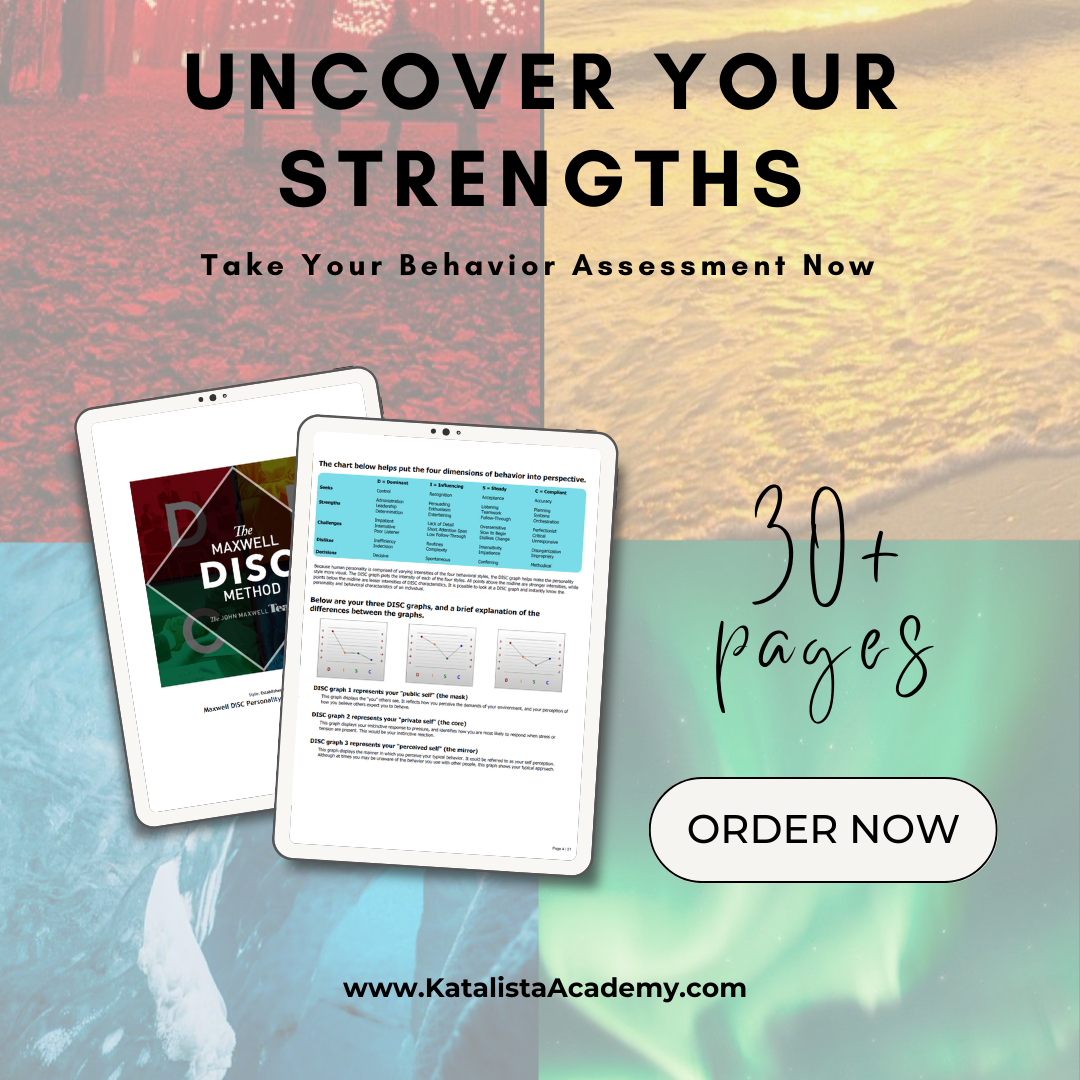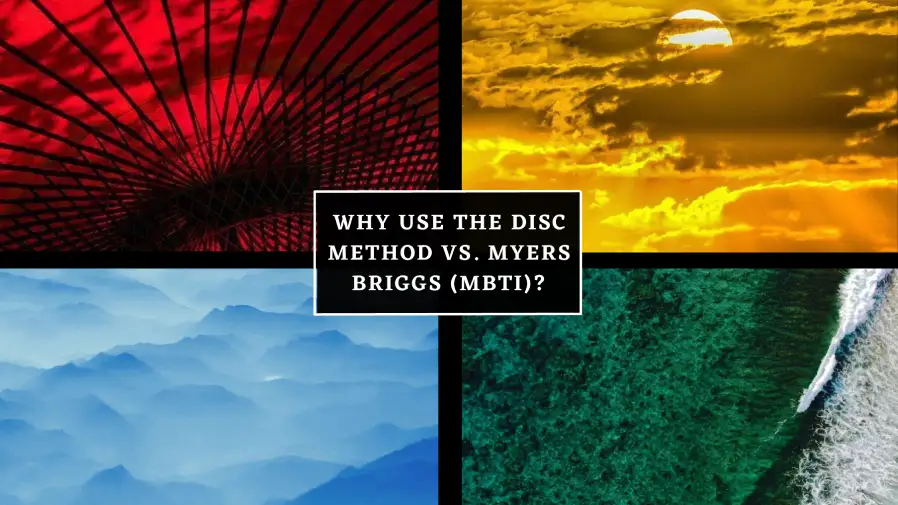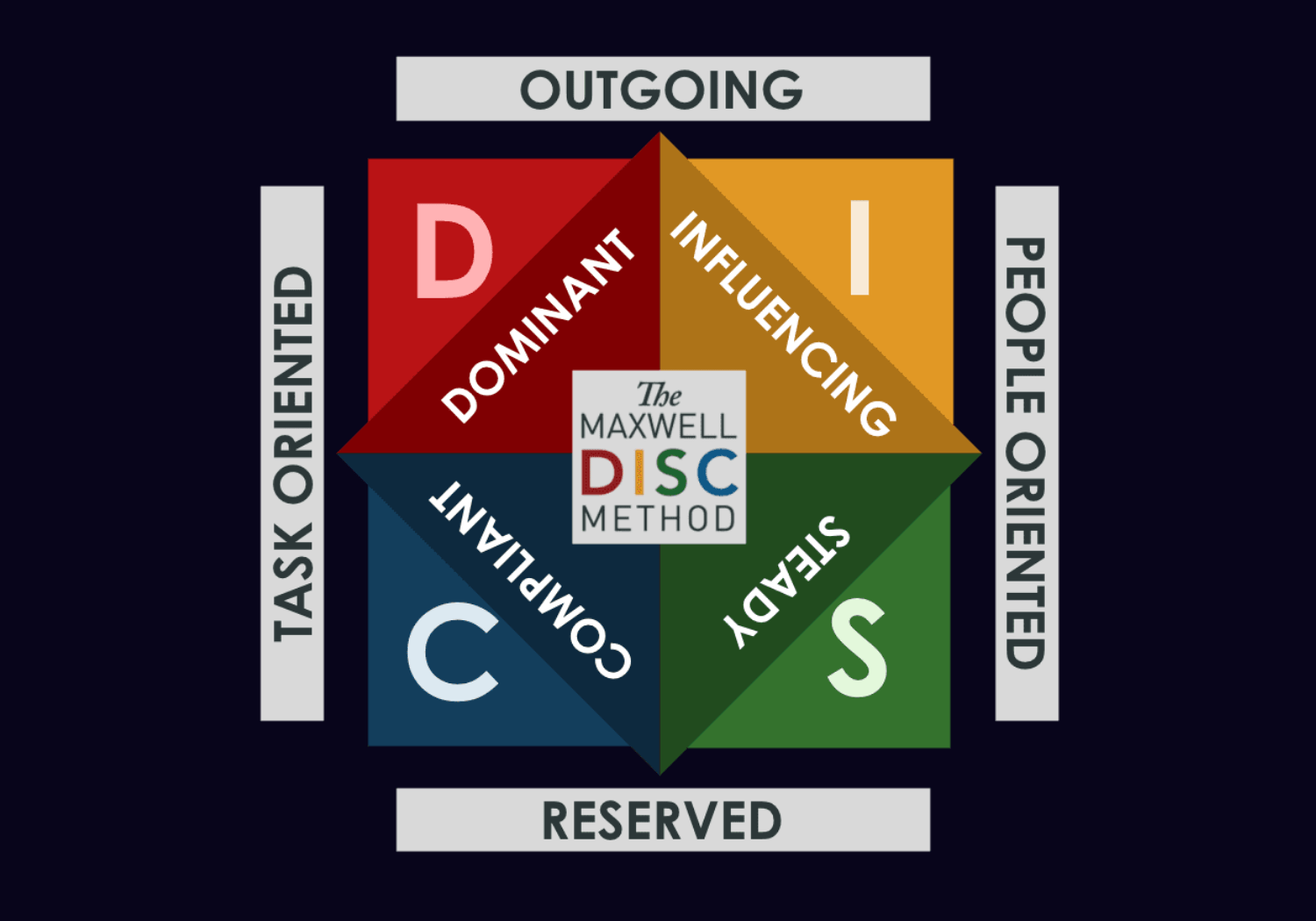Unveiling the Power of DISC Personality Insights
In the realm of self-discovery and personal growth, understanding oneself better can pave the way to improved relationships, effective communication, and success in both professional and personal endeavors.
One methodology that has been making waves in this area is the DISC Personality assessment. In this comprehensive blog post, we’ll delve into what DISC methodology is, how it can impact your life, and why it’s worth considering for your journey of self-awareness.

Breaking Down The DISC Profiles
Understanding the DISC Assessment and Maxwel DISC Report
A DISC assessment is a behavioral assessment tool designed to uncover and understand an individual's behavioral preferences and tendencies. It's founded on the DISC theory developed by William Moulton Marston, which categorizes behavior into four primary styles: High (D), High (I), High (S), and High (C).
The Maxwell DISC report, an iteration of this assessment, provides a comprehensive analysis of an individual's behavioral traits, showcasing their dominant style and the blend of other styles that contribute to their behavior. It offers valuable insights into communication preferences, decision-making tendencies, work environment preferences, and interaction styles.
Through a series of questions or scenarios, the assessment identifies where an individual falls within the DISC spectrum, aiding in self-awareness and understanding others' behaviors. Ultimately, the assessment aims to enhance interpersonal relationships, teamwork dynamics, and personal development by providing a framework for understanding and adapting to various behavioral styles.
The “D” Profile:
Those with a High D Dominant DISC personality are often assertive, results-oriented, and focused on taking charge. They thrive in challenging situations and are natural leaders, driven by goals and accomplishments. They are on the "product-oriented" and "task-oriented sides of the DISC Personality Quadrant.
The “I” Profile:
Influential High D DISC personalities are enthusiastic, persuasive, and socially skilled. They excel at building connections, inspiring others, and being the life of the party. They are on the "people-oriented" and "product-oriented" sides of the DISC Personality Quadrant.
The “S” Profile:
Steady High S DISC personalities are calm, dependable, and team-oriented. They value stability, harmony, and are great at maintaining supportive relationships. They are on the "people-oriented" and "process-oriented" sides of the DISC personality quadrant.
The “C” Profile:
Conscientious High C DISC individuals are detail-oriented, analytical, and precise. They prioritize accuracy, planning, and thrive in structured environments. They are on the "process-oriented" and "task-oriented" sides of the DISC personalityquadrant.
Impact on Personal and Professional Lives
Knowing your DISC personality type opens a window into your communication style and helps you understand how you naturally interact with others. This awareness can be transformational, leading to improved relationships, enhanced teamwork, and effective conflict resolution. For professionals, understanding the DISC framework can provide insights into your sales approach, leadership style, and overall work dynamics.
Breaking the Myth of the “Best” Personality
One common question that arises is, "What's the best personality?" The truth is, there's no one-size-fits-all answer. Each personality trait brings unique strengths to the table. The key is to harness your dominant traits and adapt your communication style based on the situation. In fact, a diverse team with various personality types can lead to a more well-rounded and innovative work environment. To read our blog about "Which DISC Personality is Best", click here.
Maximizing your impact
After discovering your DISC personality type, the next question often revolves around how to use this newfound knowledge. The insights from your assessment can guide you in tailoring your communication, leadership, and interpersonal skills to connect effectively with others. By understanding how your personality interacts with different styles, you can build rapport, minimize misunderstandings, and create more meaningful connections.
The Ease of DISC
Compared to other personality assessments, like the MBTI, the DISC framework is straightforward and easy to understand. Its simplicity doesn't compromise its effectiveness; rather, it makes it accessible to a wide range of individuals seeking personal and professional growth. To learn about the differences between the two, click here to read the blog.

Embrace Your DISC Journey
In a world where effective communication is a cornerstone of success, the DISC personality assessment provides a practical and impactful tool for personal development. By identifying your dominant traits and learning how to adapt, you can elevate your interactions, enhance your relationships, and embark on a journey of continuous improvement. So, why wait? Take the first step towards self-awareness and embark on your DISC journey today!
More DISC Resources
In your journey of understanding personalities and communication styles, you may also be curious about certain aspects, such as which DISC personality is "best" or how DISC compares to other methodologies like MBTI. Dive deeper into these topics by checking out some of our other blog posts:
Curious to know what your DISC Behavior Style is?
Order a certified DISC Assessment now and get your personalized DISC code emailed to you within 24 hours!
Stay in the Loop!
Join Our Exclusive DISC Newsletter
Unlock Fresh Insights, Tips, and Updates Delivered Right to Your Inbox.

Q: Is the DISC assessment used for hiring and team building?
A: Yes, many organizations use the DISC assessment for team building, leadership development, and employee selection to ensure a good fit for specific roles.
Q: Can my DISC personality type change over time?
A: While your core behavior traits remain relatively stable, your behavior and communication style can adapt and change in response to different situations and life experiences.
Q: What are some practical applications of DISC personality type results?
A: DISC results can be applied in various areas, such as improving communication, resolving conflicts, enhancing leadership skills, and creating more harmonious relationships.
Q: Are there any free DISC assessments available online?
A: Some providers offer free introductory versions of the DISC assessment, but for more comprehensive and accurate results, it's advisable to use a paid, certified assessment.

